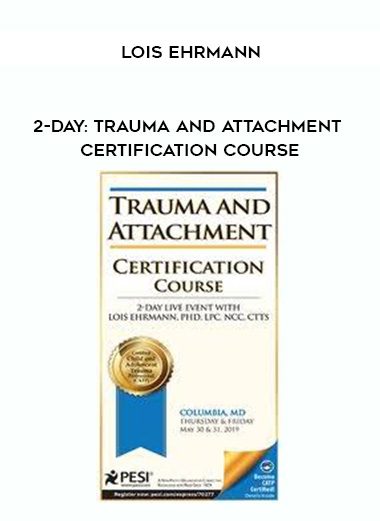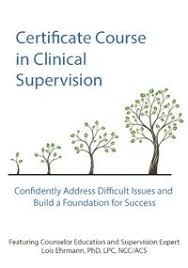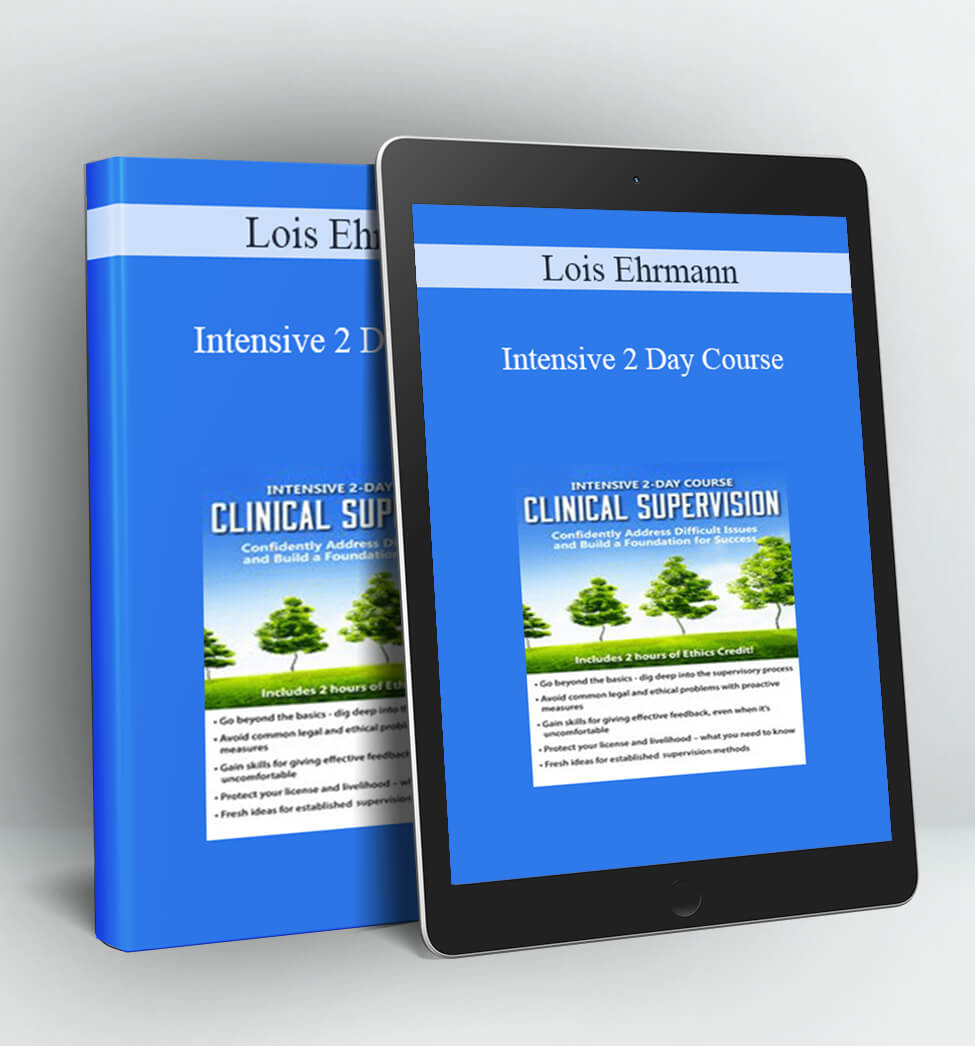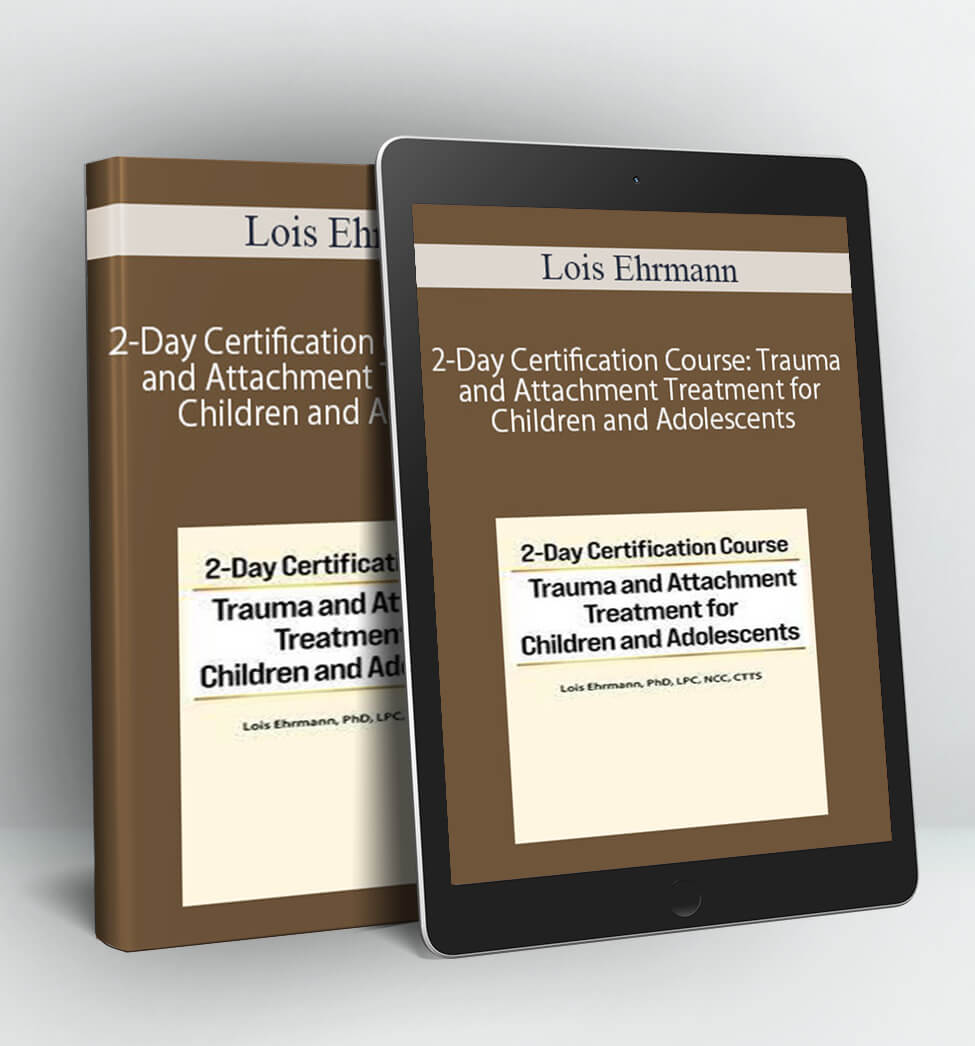Intensive 2 Day Course: Clinical Supervision-Confidently Address Difficult Issues and Build a Foundation for Success – Lois Ehrmann
Description
You’ve worked hard to develop your clinical skills and advance your career. Now you’ve been promoted to clinical supervisor and you’re excited for the opportunity. But being a good clinician doesn’t guarantee you’ll be a competent supervisor. Do you know your legal and ethical responsibilities as a supervisor? What about how to handle an incompetent supervisee? Do you know which model of supervision is the right fit for you?
Or perhaps you’ve been a clinical supervisor for a while now and you’re looking for ways to breathe new life into your practice. Helping young professionals find their voice has been gratifying and rewarding, but you’re looking for fresh ideas to incorporate into your already established methods.
This recording digs deep into the supervisory process, answers your questions about risk and liability, and prepares you to master the art and science of clinical supervision.
This workshop is specifically designed to teach you how to proactively handle and confidently address the most difficult issues faced by clinical supervisors today. You’ll learn:
- How to write a solid informed consent contract for supervision
- Ways to build the supervisory alliance so that common problems can be averted
- Tactics for giving difficult or uncomfortable feedback
- Strategies for managing an impaired or unethical supervisee
- How to protect your license – avoid common pitfalls that lead to legal and ethical dilemmas
This recording will equip you with tools and techniques you can immediately integrate into your supervision practice!
Handouts
Outline
Getting Started: How to Optimize the Initial Supervision Sessions
- Establish roles and responsibilities
- How to write a comprehensive Informed Consent Agreement and Supervisory Contract
- Set clear expectations for supervision
- Who supervises the supervisor?
- Documentation: If it’s not in writing, it didn’t happen
Models of Clinical Supervision: Find the Right Fit for You and Your Setting
- Psychodynamic
- Social role
- Developmental
- Psychotherapy-based
- Attachment-focused
- Practice: Developing your own model of supervision
The Supervisory Alliance: Building a Foundation for Everyone’s Success
- Overcome supervisee resistance, anxiety and transference
- Manage power dynamics and counter-transference
- Attend to attachment ruptures in the relationship
- Self-disclosure: Why, when, and for whom
- Practice: Supervisory relationship strengthening techniques
Techniques and Strategies for Effective Supervision
- Know Yourself: Self-Reflection Builds Supervisor Identity
- Clinical Supervisor Genogram
- Engage in reflectivity
- When to seek your own supervision
- Give Effective Feedback: Having Hard Conversations
- Summative versus formative feedback
- The ratio you must know to give corrective feedback
- Specific counselor interventions
- Explore the inner world of the supervisee
- Activation triggers
- Observation Methods: Pros and Cons
- Live observation
- Audio-video recordings
- Interpersonal process recordings
- Mindfulness Practices to Support Supervisees
- Centering activities to begin each session
- Thought/meditation cards
- Breathing exercises
- Illustrate Supervisee/Client Interactions
- Parts maps
- Diagrams
- Resolve Supervisor/Supervisee Tensions
- Structure versus free reign
- Directive versus non-directive
- Nurture versus neutrality
- Reflectivity: More Than Active Listening
- Person of the therapist exercise
- Reflection letters
- Journaling
Cultural Competence: Proactive Treatment of Cultural Differences
- When the supervisor-supervisee dyad is impacted
- Methods for identifying supervisee cultural and contextual background factors
- Strategies for increasing awareness of bias
- Ways to identify and manage micro-aggressions
- Practice: Having uncomfortable conversations about cultural differences
Group Supervision
- When to utilize groups
- Advantages of a group setting
- Tips for setting up group norms
- Methods for strengthening the supervisory alliance in group
- Practice: Role plays of group scenarios
Legal/Ethical Issues: Protect Yourself, Protect Your License
- Know your code: ACES/ACA, APA, ASWB/NASW, AAMFT
- Are you a competent supervisor?
- How to evaluate supervisee competency
- Everything you need to know about:
- Standard of care
- Informed consent
- Boundaries
- Privacy vs confidentiality
- Dual relationships
- Liability: Direct and vicarious
- Duty to Warn
- Social media/use of technology
- and more!
- Decision tree relevant to clinical supervision
- Practice: Handling an impaired supervisee
Faculty

The Individual and Family Choices program
Lois Ehrmann, Ph.D., LPC, NCC, CTTS, is a trauma-informed and sensitive clinician who works with individuals and families who suffer from trauma, abuse and attachment issues. She is the founder of The Individual and Family CHOICES Program, a holistic trauma-informed counseling center in State College, PA, that has been providing cutting-edge trauma-informed therapy for over 10 years. Prior to that she co-owned a dual diagnosis outpatient counseling program called Counseling Alternatives Group for over 18 years. She is a Licensed Professional Counselor in both Pennsylvania and New Jersey and has been in clinical practice for over 30 years, specializing in trauma and attachment for over 22 years.
A Certified Trauma Treatment Specialist (CTTS), Lois is also an Approved Consultant and Certified Clinician in Eye Movement Desensitization Reprocessing (EMDRIA) as well as a Certified Internal Family Systems Clinician. Trained in IFS Levels 1, 2 and 3 as well as Somatic IFS, she has introduced the IFS model to the children and families she works with, as well as groups of parents of traumatized children and to professional healers who work with traumatized families. Lois is a Registered ATTACh Clinician, Certified Attachment Focused Family Therapist/Consultant and an Approved Clinical Supervisor (NCE). In addition, she is a trained neurofeedback clinician and trained in clinical hypnosis.
Lois is a sought-after trainer both locally and nationally and is also an adjunct assistant professor in counselor education and supervision at PSU. She has presented nationally for many years for the National ATTACh Conference and until very recently served on that organization’s board of directors. Lois has also presented annually for the Internal Family Systems Conference specifically focusing on the use of IFS with children and families struggling with attachment issues.
Lois is the co-author of a book on best practices in attachment therapy and has self-published books for children and their parents on attachment and Internal Family Systems concepts. She was the lead researcher in the development of the Internal Family Systems Adherence Scale for the Internal Family System Foundation.
Speaker Disclosures:
Financial: Lois Ehrmann is founder and executive director of The Individual and Family CHOICES Program. She receives a speaking honorarium from PESI, Inc.
Non-financial: Lois Ehrmann has no relevant non-financial relationship to disclose.
Proof Content:
Delivery Method:
After your purchase, you’ll get access to the downloads page. Here, you can download all the files associated with your order.
Downloads are available once your payment is confirmed, we’ll also send you a download notification email separate from any transaction notification emails you receive from Vinlearn.











